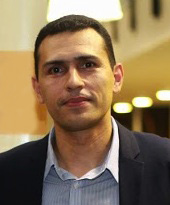Room: Amphi Gaston Planté (stair 35, 1st floor), Cnam, 2 rue conté, 75003 Paris
Date: June 14, 2023. 14h-16h
Title: Data Science for Cybersecurity: An Overview Focused on Networking
Speaker: Michele Nogueira, Federal University of Minas Gerais (UFMG), Brazil

Abstract: Cyberattacks persistently pose threats to valuable data, resulting in time and resource wastage, and damaging the reputation of companies and institutions worldwide. Even prominent organizations have experienced the severe consequences of cyberattacks, impacting not only themselves but also their customers, collaborators, and society at large. Ransomware such as WannaCry continues to pose a significant threat, encrypting data and demanding ransom payments in Bitcoin cryptocurrency. Furthermore, sophisticated versions of Distributed Denial-of-Service (DDoS) attacks, originating from various Internet-connected devices like IP cameras, residential gateways, and baby monitors, disrupt major Internet platforms and services, affecting users globally. These examples underscore the increasing power and sophistication of cyberattacks, highlighting the evolving nature of cybersecurity. In the era of ubiquitous systems, with an estimated 75 billion connected devices or “smart things” expected by 2025, the urgency to address these issues is apparent. However, academia’s role in combating the sophistication of cyberattacks remains a crucial aspect. Can academia effectively anticipate attackers’ next moves to safeguard our information assets? How can academia harness the data generated on networks to develop security intelligence and preemptively prevent attacks? This presentation aims to initiate a discussion surrounding these questions, providing an overview of the related research conducted by Dr. Nogueira’s research team, along with future directions in these areas.
Bio: Michele Nogueira is an Associate Professor in the Computer Science Department at Federal University of Minas Gerais (UFMG), Brazil. She received her doctorate in Computer Science from the University Pierre et Marie Curie – Sorbonne Université, France. She was on a sabbatical leave at Carnegie Mellon University, USA (2016-2017). Her research interests include wireless networks, security, and dependability. She has worked on providing resilience to self-organized, cognitive and wireless networks by adaptive and opportunistic approaches. Dr. Nogueira was one of the pioneers in addressing survivability issues in self-organized wireless networks, being the work “A Survey of Survivability in Mobile Ad Hoc Networks”, one of her prominent scientific contributions. She has been a recipient of Academic Scholarships from Brazilian Government in her undergraduate and graduate years; and of international grants such as the ACM SIGCOMM GeodiversityAldri Santos program. She has served as Associate Technical Editor for the IEEE Communications Magazine. She served as chair for the IEEE ComSoc Internet Technical Committee, and she is an ACM and IEEE Senior Member.
Title: Resilience for Critical Services in Dense Networks
Speaker: Aldri Santos, Federal University of Minas Gerais (UFMG), Brazil

Abstract: Society has sped up digitization in many areas, increasing the number of users and devices connected to networks and demanding faster services to support compute-intensive and time-sensitive applications. Further, the development of other technologies characterized by mobility, such as autonomous vehicles, Unmanned Aerial Vehicles (UAV), and High Altitude Platforms (HAP), has improved connectivity services, also providing services over uncovered or under-served geographical areas. In this context, the integration and interconnection of several existing networks, including Internet of Things environments, will allow the connection of a myriad of heterogeneous devices to the Internet and enable the creation of dense networks, with various critical application domains. These networks also experience several disruptions, like attacks and equipment failures. This talk will present an overview of dense networks, and the existing resilience concepts, and also will briefly about some cases to support dense network operation.
Bio: Aldri Santos is a Full Professor in the Computer Science Department at the Federal University of Minas Gerais (UFMG), Brazil. He holds a Ph.D. in Computer Science (2004) from the Federal University of Minas Gerais, a Master’s degree in Informatics (1999) and a Bachelor’s degree in Informatics (1995) from UFPR. He has been dedicated to research in the area of network management, fault tolerance, security, data dissemination, IoT networks, UAVs, VANETs, WBANs, Cyber-Physical Systems, and dense networks. Aldri has coordinated national and international research projects, participated in national and international symposia program committees, acted as a reviewer for journals and funding projects, and in the organization of national and international scientific events. He is an associate editor of the IEEE journal Transactions on Network and Service Management (TNSM). He served as the coordinator of the Special Commission on Information and Computer Systems Security (CESeg) of the SBC in the biennium (2014-2016) and vice-coordinator in the biennium (2012-2014). He is a member of the Communications and Information Security Technical Committee of the IEEE Communications Society (ComSoc), the SBC, the IEEE, and the ACM. Member of the Brazilian Computer Society Commission for Proposing the Training Framework for Bachelor’s Degree courses in Cybersecurity.
Title: Joint Optimization of UE-RU Association and CU-DU Placement in vRAN
Speaker: Guilherme Iecker Ricardo
Abstract: In modern mobile network architectures, Radio Access Networks (RANs) have virtualized network functions and different components of the protocol stack that may be implemented in different physical nodes, which provides flexibility, scalability, and interoperability.
In this introductory talk, we explore this disaggregated virtualized RAN (vRAN) architecture in order to improve network performance and meet specific user experience requirements by efficiently and automatically managing network resources. Particularly, we will discuss how to jointly optimize User Equipment (UE)-Radio Unit (RU) association and Central Unit (CU)-Distributed Unit (DU) placement and the underlying constraints and challenges. We propose to tackle this problem using a set of techniques ranging from classic optimization to machine learning.
Bio: Guilherme Iecker Ricardo is a postdoctoral fellow with the ROC team at CEDRIC/CNAM and a university lecturer at Université Paris Dauphine (France). In 2021, he received a Ph.D. degree in Computer Science from Université Côte d’Azur (France), having EURECOM and Inria – Sophia Antipolis as hosting research institutions. He received a bachelor degree in Computer Engineering, in 2016, and a M.Sc. degree in Computer Science, in 2018; both from Universidade Federal do Rio de Janeiro (Brazil). From January 2022 to April 2023, he was with the MORE research department at Orange Labs as a postdoctoral fellow. His research interests are in the modeling and optimization of networked systems, especially applications of edge computing technologies to communication networks. His approaches include classic and stochastic optimization as well as statistical learning techniques.
